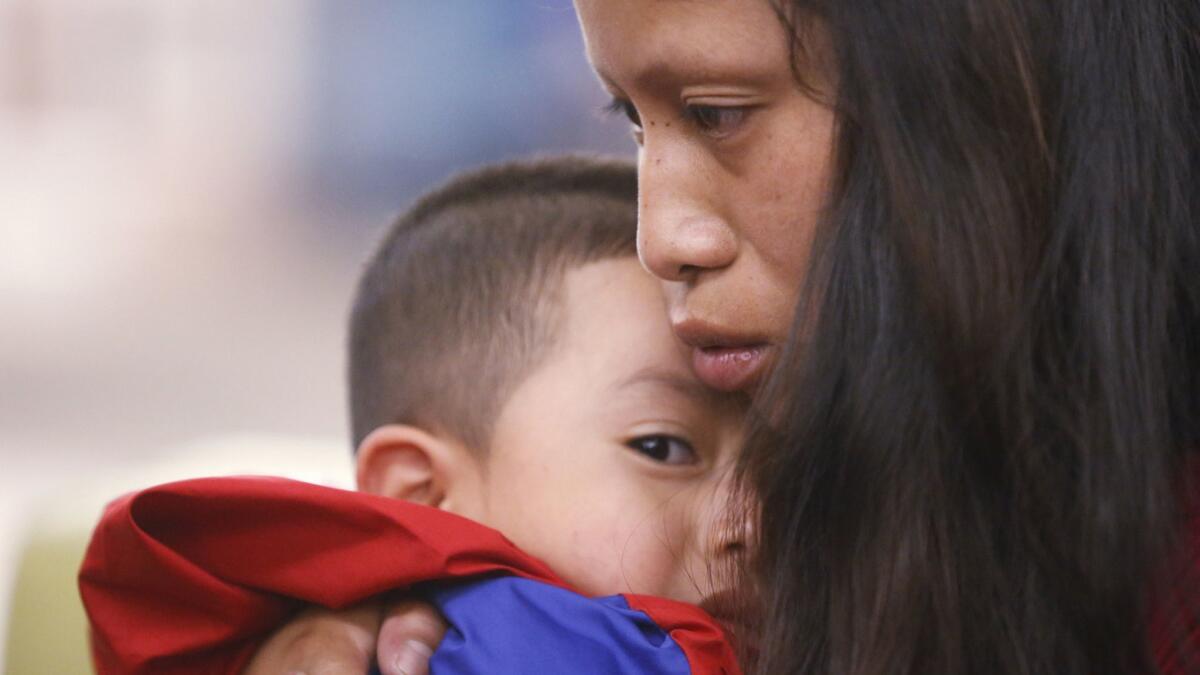Newsletter: Trump never intended to reunite immigrant families

- Share via
Good morning. I’m Paul Thornton, and it is Saturday, July 28, 2018. Apologies to anyone who didn’t catch Friday’s epic lunar eclipse — which should be almost everyone reading this, since it put on a show only over the Eastern Hemisphere. Oh well. Let’s take a look back at the week in Opinion.
Setting aside dishonesty, graft, indecency and a host of other ills, the one consistent theme of the Trump presidency has been its crisis management of problems created solely by the administration. Examples abound: a government shutdown rooted in the administration’s cancellation of DACA; desperate trade talks with the European Union because of tariffs threatened by the president; and of course, Trump clarifying, then re-clarifying his comments on Russian election meddling.
By far the most damaging example is the destruction of countless immigrant families thanks to Trump’s “zero-tolerance” policy aimed at asylum seekers and undocumented border crossers. For weeks, the administration has been scrambling to reunite thousands of children it detained with their parents to comply with Thursday’s court-ordered deadline to do. Of course, the White House was not able to meet that deadline, but it wasn’t because of incompetence. Rather, suggests Sen. Brian Schatz (D-Hawaii) in an op-ed article, this was by the administration’s design:
The separation of children from their parents at the Southwest border is not simply a policy that has resulted in immeasurable harm, but a policy designed to inflict it. The government blew its Thursday deadline to reunite these families because it never intended to do so.
How else can we explain what has happened to these families? Some 14 million checked bags are managed by the Transportation Security Administration — and that’s just during Thanksgiving weekend. Even high school students can manage a coat check for an evening without losing everyone’s coats. They match each coat and owner with corresponding tickets, and do not store the coats outside the building, or even thousands of miles away from the event.
The administration did not take even these basic measures when it began to separate children — not coats! — from their parents. It did not use corresponding numbers for the files of parents and children, or take photos of families together, or hand out hospital-style bracelets. It did not house families near one another, choosing instead to hold mothers in California and daughters in Chicago, fathers in Texas and sons in New York City.
In fact, the administration seems to have taken a comprehensive inventory of confiscated items — sneakers, toothpaste, rosaries — everything except which child belongs to which parent.
These are the actions of a government that intended to separate families but did not intend to reunite them. It meant to inflict so much suffering that other families wouldn’t make the dangerous trek. No matter how bad the violence might be in Central America, surely these families would choose to stay united rather than come and be separated.
Obama’s economy hit Trump’s high numbers — three times. Give the president all the credit he deserves for the 4.1% growth rate of the U.S. economy last quarter (and it’s debatable how much credit any president should get). But for all Trump’s bluster about the economy surging like it never has before, the president should keep in mind the GDP numbers 4.6%, 4.9% and 5.1%. Those are quarterly growth rates hit under President Obama, notes Jon Healey. L.A. Times
Not in my front beach. Anyone who’s spent years in California understands that maintaining access to the state’s beaches — which the public owns, by the way — is a constant battle. Still, it helps to have an outside newspaper bring the the rest of the country up to speed, if only to remind Californians of where they once were on beach access, and how adept wealthy landowners have become at keeping us off our property. New York Times
A heartbreaking account of life at Gitmo for a “forever prisoner”: Ahmed Rabbani, a Pakistani taxi driver, was wrongly detained in his home country 14 years ago and handed over to the CIA. He was tortured (he writes that his shackling was so painful, he tried to free himself by attempting to cut off his hand), and now a prisoner at Guantanamo Bay, he weighs 95 pounds thanks to an illness that makes eating food almost impossible. There’s no hope for him, other than a government that rediscovers its humanity and finally closes Gitmo. L.A. Times
Give me shelter, but not at double the cost. The first pop-up shelter in downtown Los Angeles was supposed to cost about $1.3 million to build — but when it opens in September, it will have cost the city $2.7 million. The cost overrun is not completely unreasonable, says The Times Editorial Board, but the city’s focus should be on permanent supportive housing, not well-appointed transitional shelters. L.A. Times
The LAPD’s new chief gets high marks for transparency. There are plenty of questions about the actions of Los Angeles police officers at the Silver Lake Trader Joe’s on July 21 — the store’s manager was killed in a firefight after being hit by a bullet from an officer’s gun — but what is not controversial is the department’s decision to release body camera video soon after the incident. To LAPD Chief Michel Moore, The Times Editorial Board says well done. L.A. Times
Reach me: paul.thornton@latimes.com